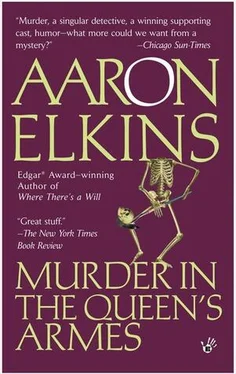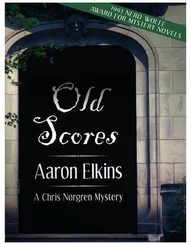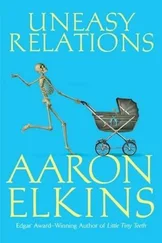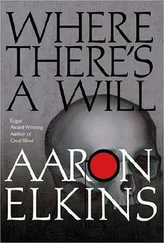Aaron Elkins - Murder In The Queen's armes
Здесь есть возможность читать онлайн «Aaron Elkins - Murder In The Queen's armes» весь текст электронной книги совершенно бесплатно (целиком полную версию без сокращений). В некоторых случаях можно слушать аудио, скачать через торрент в формате fb2 и присутствует краткое содержание. Жанр: Классический детектив, на английском языке. Описание произведения, (предисловие) а так же отзывы посетителей доступны на портале библиотеки ЛибКат.
- Название:Murder In The Queen's armes
- Автор:
- Жанр:
- Год:неизвестен
- ISBN:нет данных
- Рейтинг книги:4 / 5. Голосов: 1
-
Избранное:Добавить в избранное
- Отзывы:
-
Ваша оценка:
- 80
- 1
- 2
- 3
- 4
- 5
Murder In The Queen's armes: краткое содержание, описание и аннотация
Предлагаем к чтению аннотацию, описание, краткое содержание или предисловие (зависит от того, что написал сам автор книги «Murder In The Queen's armes»). Если вы не нашли необходимую информацию о книге — напишите в комментариях, мы постараемся отыскать её.
Murder In The Queen's armes — читать онлайн бесплатно полную книгу (весь текст) целиком
Ниже представлен текст книги, разбитый по страницам. Система сохранения места последней прочитанной страницы, позволяет с удобством читать онлайн бесплатно книгу «Murder In The Queen's armes», без необходимости каждый раз заново искать на чём Вы остановились. Поставьте закладку, и сможете в любой момент перейти на страницу, на которой закончили чтение.
Интервал:
Закладка:
Murder In The Queen's Armes
Aaron Elkins
ONE
Edward Hall-Waddington, O.B.E., M.A., Ph. D., F.S.A., ran his hand nervously over a pink and liver-spotted pate, absently brushing back a lock of hair that had been gone for almost forty years.
"Oh, dear," he said in tremulous distress. His white eyebrows knitted atop a beaky, jutting nose that was at odds with an otherwise frail and retiring face. "My word, Professor Oliver! Only an hour? But there’s so very much to see…" His words trailed sorrowfully off, and the hand moved from his brow to take up the burden of his message, gesturing vaguely at the dusty glass cases and musty corridors that lay beyond the door of his tiny, cluttered office.
"I wish I had time to see everything in the museum, sir," Gideon Oliver said courteously. He sat, more than a little cramped, in a small side chair at the elderly archaeologist’s desk, his shoulders too wide for the narrow space between desk and wall, his long legs twisted out of the way off to the side. "Actually, Dorchester wasn’t on our itinerary at all, but I couldn’t imagine being in England without paying my respects."
"To be sure, to be sure," Professor Hall-Waddington said, pink cheeks showing his pleasure. "And to Pummy as well, no doubt?" The eyebrows went up, and cheerful blue eyes twinkled out from under them.
"Pummy, too," Gideon said, smiling.
The prize possession of the Greater Dorchester Museum of History and Archaeology was a six-by-eight-inch piece of curving, darkened bone, most of the back of a thirty-thousand-year-old human skull that had been unearthed by a World War II bombing at nearby Poundbury and fortunately recognized for what it was by the amateur but competent Greater Dorchester Historical and Archaeological Society. Poundbury Man was of considerable anthropological significance because Britain, so rich in archaeological sites, was notably lacking in actual skeletal remnants of ancient man. From the first, the fragment had affectionately and quite naturally been dubbed "Pummy." (With typical English disdain for the middle parts of names, Poundbury is pronounced "Pum’ry.")
It was extraordinary to have such an object housed in a provincial museum run by an amateur antiquarian society, but Professor Hall-Waddington had lent his considerable weight to the society’s claims when the find had been made. In 1944 he had been one of England’s foremost archaeologists, a colleague of Grahame Clark, V. Gordon Childe, and Leonard Woolley, and Dorchester had gotten to keep its find. When the professor had retired from the British Museum more than thirty years later, after the death of his wife, the society had timidly invited him to become curator of the museum. He had accepted with gratitude, and the collection had become the love of his life.
"Well, let’s go and see him, shall we?" he said, rising with unexpected sprightliness. "We’ll follow the well-worn path to his case. Old fellow gets quite a lot of attention, you know. You’re the second American to pay him a visit this week, as a matter of fact."
"Oh? Another anthropologist? Someone I might know?"
"No, no, I doubt it. I didn’t get his name. Student, from the look of him. Spent most of the morning slouching about."
When they walked from the little office into the nearly deserted exhibit rooms, Gideon saw that the museum wasn’t dusty at all, and certainly not musty. It only looked as if it should be: a hodgepodge of waist-high glass cases with row upon dull-looking gray row of projectile points and stone flakes, each one painstakingly identified and cataloged on its own typewritten card. Improbable and seemingly inapposite objects stood in dark corners, leaned against the walls, and even lay unprotected on worn tables of dark wood. It was, Gideon admitted to himself, a look that he liked, for he was not a champion of the museum-asentertainment-center, with buttons to push, levers to pull, and slick, nonexplanatory placards. They taught little, and they attracted hordes of marginally interested kids who jumped from contrivance to contrivance, comprehending nothing worth knowing. No, this was the way a museum ought to look, as old-fashioned as it was. He even liked the smell: a chalky, flinty mixture of old, worked stone and floor polish.
Their progress toward the Poundbury exhibit was slow and halting. Professor Hall-Waddington paused at almost every object they passed to murmur a few words about it and, if it was not encased, to run a hand lovingly over it.
"Fragments of a bell mold. Cast in 1717. Don’t see many of these."
"Ah," said Gideon.
"Romano-British sarcophagus here. Found in 1925. Body’d been completely packed in chalk, except for the head. What do you make of that? Quite curious."
"Huh," Gideon said. "Interesting."
"And these are the old borough stocks. Used to stand against the side of the town hall. They’d put their feet in the holes, of course. Do you have any idea when that all began?"
"Uh, no, I’m afraid I don’t," Gideon said.
"Ha! Thought you wouldn’t. Have a guess."
"Sixteenth century?"
" Six teenth century!" cried Professor Hall-Waddington, delighted. "My word, no! It’s from Anglo-Saxon times. And in 1376, Parliament decreed every town had to have a set of them. Decree’s never been abolished, you know. This is ours."
"Is that so?" Gideon breathed politely, looking with secret longing toward the case in which he knew the famous skullcap lay.
The old man shuffled a few steps on, but stopped rather firmly ten feet short of the goal. "Now here," he said, placing his hand tenderly on a monstrous, grimy pair of bellows standing on end against the wall, as if some fifty-foot giant of a blacksmith had leaned it there for a few seconds while he had a sip from a bucket of water. "Now here are the actual bellows from the Downtown Forge."
"Mm," Gideon said. "Ah."
"Most bellows authorities claim these were manufactured in 1792, you know, but I hold firmly with 1796 or even later. What would you say, Professor?"
The fact that there was such a thing as a bellows authority came as news to Gideon. "Well," he said, "uh…I’d say 1796 or 1797."
"Ah, and quite right you’d be. Quite right. No question about it in my mind. I’d be curious about your own rationale, however." He turned his frank, clear, blue eyes expectantly on Gideon.
"Well," said Gideon. He coughed gently and looked surprised. "Is that the Poundbury skull over there?"
"What?" Professor Hall-Waddington looked over his shoulder at the case with the golden fragment of bone in it. "Why, yes, of course it is. I keep forgetting you’re a physical anthropologist and not another fuddy-duddy old antiquary like me." He chuckled pleasantly. "Here you are, come all this way to pay homage to old Pummy, and I’ve been prattling on about bellows."
"Not at all," Gideon said quickly. "It’s been fascinating."
"Kind of you to say so, but now let’s have a look at him, shall we?"
There was, however, one obstacle still to be negotiated- an exhibit consisting of what seemed to be two vicious-looking pitchforks chained together scissors-fashion, and Professor Hall-Waddington was unable to ignore it in passing.
"Know what this is?" At the absence of Gideon’s usual courteous murmur, he spoke a little louder. "It’s an old hay-devil. Used for bringing hay from wagon to rick, you see…"
Gideon hardly heard him. He was staring at the Poundbury skull fragment only a few feet away. Something was wrong with it, so wildly wrong that it had him momentarily doubting his senses. "Poundbury Man," he whispered, unaware that he was speaking aloud. "Isn’t it supposed to be an elderly man, long-headed…?"
"Supposed to be?" Professor Hall-Waddington echoed, bewildered. "Of course it is. Le Gros Clark himself aged it, and sexed it, and estimated the cranial index. Sir Arthur Keith verified it, and so did your own Hooton."
Читать дальшеИнтервал:
Закладка:
Похожие книги на «Murder In The Queen's armes»
Представляем Вашему вниманию похожие книги на «Murder In The Queen's armes» списком для выбора. Мы отобрали схожую по названию и смыслу литературу в надежде предоставить читателям больше вариантов отыскать новые, интересные, ещё непрочитанные произведения.
Обсуждение, отзывы о книге «Murder In The Queen's armes» и просто собственные мнения читателей. Оставьте ваши комментарии, напишите, что Вы думаете о произведении, его смысле или главных героях. Укажите что конкретно понравилось, а что нет, и почему Вы так считаете.












